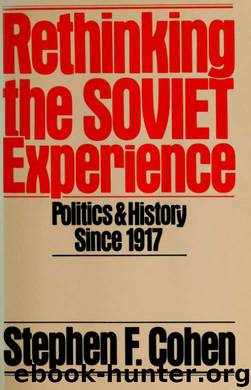Rethinking the Soviet experience : politics and history since 1917 by Cohen Stephen F

Author:Cohen, Stephen F
Language: eng
Format: epub
Tags: Geschichte
Publisher: New York : Oxford University Press
Published: 1986-04-16T05:00:00+00:00
The third important factor that favors reform also involves the official ideology. The role of classical Communism, or Marxism-Leninism, may have declined in recent years, but it remains the essential medium of discourse and boundary of conflict throughout official Soviet politics. No reformist or conservative movement anywhere can be successful if it is estranged from established political norms and culture. Both Soviet conservatives and reformers must have a Soviet face: they must find inspiration and legitimacy somewhere within the historical experience and ideas of Marxism-Leninism. Therefore, as Soviet reformers complain, conservatives are trying to fill "Marxist formulas" with their own meanings.^"^ But Marxism-Leninism is an unreliable conservative vehicle because it is an ideology, even in its dogmatized version, based upon the very idea, desirability, and inexorability of change. Soviet reformers miss no opportunity to make this point:
"Any apologetics for things as they are is ahen to the mater-iahstic dialectic . . . This applies to any particular form society may have assumed at any stage in its development. To search constantly for new and imaginative ways to transform reality—that is the motto of the dialectic."^^
In that respect, official Soviet reformers have an ideological advantage lacked by their nineteenth-century predecessors in the tsarist bureaucracy, whose historical experience is useful in thinking about the future of post-Stalin Russia.^^ Struggling against a conservative majority of Russian officials during the decades leading up to the Great Reforms finally carried out from above in the 1860s, tsarist reformers were seriously hampered by an official conservative ideology thoroughly hostile to the idea of real change. They had to seek ideological inspiration and legitimacy for reform elsewhere, particularly in "foreign" Western cultures that were then, and remain today, politically suspect in Russia.
Reformers in the Soviet bureaucracy do not have that problem or at least not so acutely because Marxism-Leninism can legitimize the idea of "new and imaginative ways." Moreover, as they have since the 1950s, Soviet reformers can point to decentralizing economic reforms carried out by Communist parties in Eastern Europe—an area that for Russians is west, but not "the West"—as models that are Marxist-Leninist and thus fraternal rather than "foreign."'^^ The Eastern European example is, of course, a two-edged political sword. Political crises in the region, as in Czechoslovakia in 1968 and in Poland since the late 1970s, have reinforced the Soviet conservative axiom that such reforms may sometimes be politically acceptable in small Communist countries but never in large heterogeneous ones like the Soviet Union. Nonetheless, successful reforms in Eastern Europe continue to abet the reformist cause in Soviet officialdom, as must the dramatic NEP-like changes underway in China, a country even more populous and potentially unruly than the Soviet Union.^^
The experience of tsarist reformers offers another impor-
tant perspective on the Soviet Union more than a century later. The growth of reformist attitudes and "enUghtened" officials in the tsarist bureaucracy was a slow cumulative process. It stretched over several decades and suffered many setbacks. During the long winters of reform, particularly during the reign of
Download
This site does not store any files on its server. We only index and link to content provided by other sites. Please contact the content providers to delete copyright contents if any and email us, we'll remove relevant links or contents immediately.
| Africa | Americas |
| Arctic & Antarctica | Asia |
| Australia & Oceania | Europe |
| Middle East | Russia |
| United States | World |
| Ancient Civilizations | Military |
| Historical Study & Educational Resources |
Red Famine: Stalin's War on Ukraine by Anne Applebaum(2928)
Midnight in Chernobyl by Adam Higginbotham(2541)
Chernobyl by Serhii Plokhy(2535)
Midnight in Chernobyl: The Untold Story of the World's Greatest Nuclear Disaster by Adam Higginbotham(2222)
The House of Government by Slezkine Yuri(2200)
Red Shambhala by Andrei Znamenski(2193)
The Gulag Archipelago (Vintage Classics) by Aleksandr Solzhenitsyn(2096)
Red Notice by Bill Browder(2070)
All the Kremlin's Men by Mikhail Zygar(2064)
From Cold War to Hot Peace by Michael McFaul(2029)
Putin's Labyrinth(2016)
From Russia with Lunch by David Smiedt(1971)
The Future Is History by Masha Gessen(1904)
A People's Tragedy by Orlando Figes(1864)
The Romanovs by Simon Sebag Montefiore(1820)
How to Tame a Fox (and Build a Dog): Visionary Scientists and a Siberian Tale of Jump-Started Evolution by Lee Alan Dugatkin & Lyudmila Trut(1769)
Putin's Labyrinth: Spies, Murder, and the Dark Heart of the New Russia(1745)
The Lost Spy by Andrew Meier(1745)
Art and Revolution by John Berger(1721)
